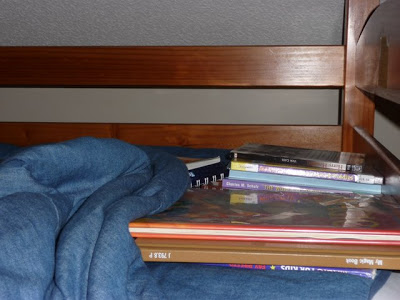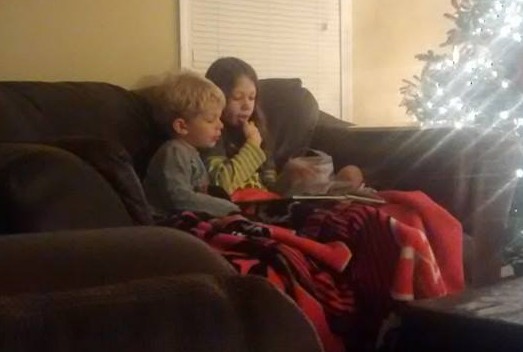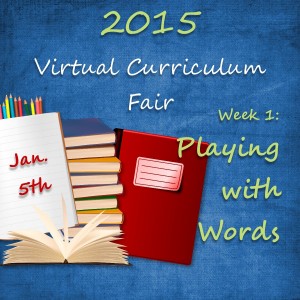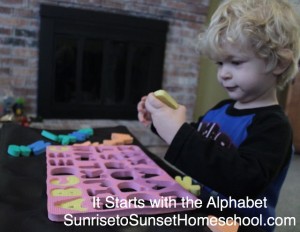Other than answering the dreaded socialization question, teaching reading at home may be the scariest thing for a new homeschooler. This week’s Virtual Curriculum Fair topic is Loving Language Arts and is co-hosted by Susan @ Homeschooling Hearts & Minds and Chareen @ Every Bed of Roses. You can read other posts about reading as well as other language arts topics.
What if I mess it up and ruin my child’s life forever?
This is our 12th year of homeschooling, and I have 5 children ranging from 4 to 16 years old. So far, I have taught 4 children to read and each one was different. Not surprisingly, each one is still different both in his or her ability and enjoyment of reading. I don’t have one of those stories about the kid who learned to read at 12, but was reading War and Peace at age 13.
There is no magic formula for raising readers.
David, my 16 year old, began reading at 4 years old. (Some of that may have been over eager homeschool parents, but he was ready to read.) He read a lot when he was young – both fiction and non-fiction. I also read books aloud to him from his infancy until he was about 12. My husband and I read for pleasure frequently and our house is filled with books. We did everything “right” and guess what. He doesn’t like to read. He especially doesn’t like fiction. He’s a “just the facts” kind of kid. Maybe his long-time use of the computer has turned him into a scanner. Since he especially doesn’t like literature, I have had him take an outside class for that. He’s infinitely more motivated to read books when he’s in a class with a fixed schedule and accountability. To help himself pay attention, he often listens to the audio while he reads.

Sometimes a child is too young to learn to read.
Anna is almost 15. We started trying to teach her to read when she was 5, probably closer to 5-1/2. She wanted to learn to read so badly. It was almost comical trying to teach her to blend sounds. She just couldn’t get it until after she turned 6. Then it sort of clicked and she took off with it. She also listened to read-alouds frequently and had essentially the same learning environment as her older brother, but unlike her brother, she loves to read, especially historical fiction. She’s also much happier to read from a textbook and has good comprehension.
If you think there is something wrong, check it out. People will tell you to relax and wait, but you know your child.
William is almost 13. He has been diagnosed with ASD. He has many learning issues that may (or may not) be related to ASD. He is my only child that I actually had to teach letters. My other children all picked them up naturally around 3 years old or younger, from alphabet books, letter toys and puzzles. At 4-1/2, I decided I needed to teach William his letters. He was able to learn them fairly quickly. I used the Handwriting without Tears Wood pieces and cards.
Reading continued to be a struggle for William. I tried various phonics programs. He couldn’t read c-v-c words consistently. I started a couple of new things with him that finally seemed to help reading click for him. I used both Brain Integration Therapy by Dianne Craft and All About Spelling. I don’t know if it was either of those programs, the passage of time, or some combination of all three that finally enabled him to begin reading. But there was no sudden burst of speed or rapid improvement in skills allowing him to catch up to grade level. Instead, it’s been more like plodding. He can decode pretty well and his spelling is pretty good too. (I love All About Spelling!), but his comprehension is almost non-existent, and his inflection is bad. We’re trying immersion reading on the Kindle Fire to see if that will help with comprehension. We also do dictation with All About Spelling and use the repeating of the sentence to work on inflection. (The problem is not just with reading, it’s with his speech in general.)
Some children love to read. Others don’t.
Lizzie is 8. I honestly don’t remember teaching her to read. She didn’t exactly teach herself to read, but I think she learned using a combination of computer programs like Reading Kingdom and Reading Eggs plus her older brother and sister showing her things. She is a voracious reader and loves to curl up with a book and read it. She even reads aloud to her little brother, Andrew. She is using the Memoria Press Literature Guides, among other things, and we like those a lot.

Find time to read to your little ones.
Finally there is Andrew. He just turned 4 and is not reading yet. He does love to listen to books and he has known his letters for a long time. I feel hopeful, that it won’t be a struggle for him to learn to read. I still want to spend some time using Before Five in a Row with him.

This post is part of the 2015 Virtual Curriculum Fair and is also linked to House to Home at I Choose Joy.
See my previous Playing with Words posts at:
Don’t miss these great posts!
Building a Foundation of Words by Susan @ Homeschooling Hearts & Minds
Language Arts for 2015 by Chareen @ Every Bed of Roses
Bible-Based Language Arts Resources by Tauna M @ Proverbial Homemaker
Relaxed Homeschooling: Language Arts in the Early Elementary Years by Brittney @ Mom’s Heart
Loving Books and Words by Sarah@Delivering Grace
5 Language Arts Resources We Love by Becky @ Milo & Oats
Teaching Reading at Home: A Tale of 5 Readers by Kristen H. @ Sunrise to Sunset
A More Simplistic Approach to 7th Grade Language Arts by Christy @ Unexpected Homeschool
Language Arts Reading for Delight-Directed Learning by Susan @ The Every Day of Education
How To: Spelling Dictation by Heather @ Only Passionate Curiosity
The World of Words in our Homeschool by Joelle @ Homeschooling for His Glory
Unschooling and Words, Words, Words by Nicole @ Schooling in the Sun
Learning With Literature and Language Arts Resources by Leah @ As We Walk Along the Road
Words and More Words! by Michele @ FamilyFaithandFridays
Language Arts in Our Homeschool (2014 ñ 2015) by Laura O @ Day by Day in Our World
Our curriculum choices ~ Language Arts by Renata @ Sunnyside Farm Fun
The 2015 Virtual Curriculum Fair ~ Language Arts in Our Homeschool by Jennifer @ A Glimpse of Our Life
Loaded Pistols: Virtual Curriculum Fair Playing with Words by Lisa @ Golden Grasses
A Renewed Focus on Reading Aloud by Debra @Footprints in the Butter
Language Arts in our Classical / Charlotte Mason Homeschool by Sharra @ The Homeschool Marm
Logic of English Foundations: The Grand Prize Winner of Phonics by Chelli @ The Planted Trees
A Sentence a Day Teaches Grammar the Fun Way by Amy A @ One Blessed Mamma
Tackling Language Arts by Jacquelin @ A Stable Beginning
Middle School Monday – Lightning Literature and Composition by Kym @ Homeschool Coffee Break
The Great Grammar Discovery by Laura @ Four Little Penguins

By Kristen H.




My ASD son is 7.5, we use explode the code, all about reading, and various easy readers. He still struggles to read, but his reading comp is decent:) he sounds out every word he reads in a story (even if he knows the word), but when reading words in isolation for example (like flash cards), he just says the word with no sounding out! I cannot figure out why this is…..any suggestions? You me tinned with your son William you are trying immersion reading on your Kindle, can you explain that more?
Many many thanks:)
I agree—every one of my children has had his/her own unique path to becoming the reader. One of the reasons our family homeschools is so the kids don’t have to fit into a “one-size fits all” type of schedule and that has been a blessing.
Thank you for joining the VCF!
Blessings,
Susan